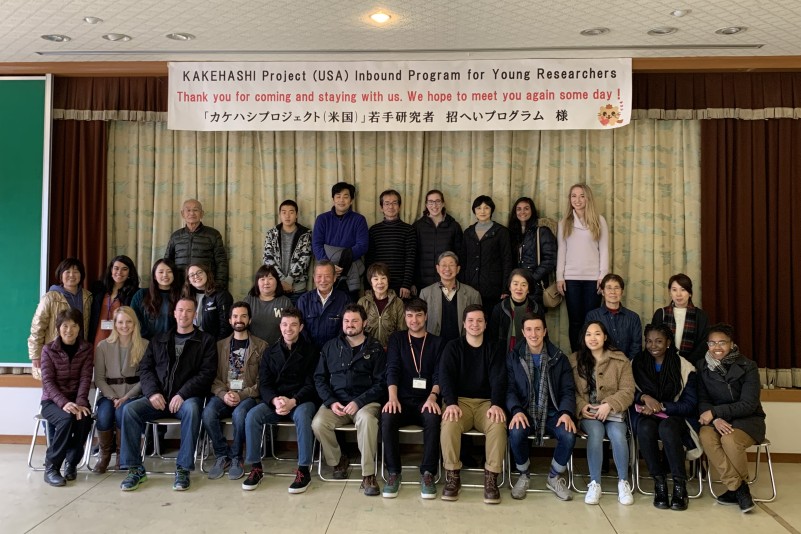A Partnership Between the Penn Biden Center, the School of Arts and Sciences, and the Embassy of Japan The Kakehashi Project
Basic Page Sidebar Menu Penn Biden Center
Penn students who traveled to Japan with the Penn Biden Center in January 2019 as part of the Kakehashi Project pose in front of the O-Torii Gate at the Itsukushima Shrine.
The Penn Biden Center for Diplomacy and Global Engagement, working with the School of Arts and Sciences and the Embassy of Japan, is proud to announce an exciting opportunity for Penn students to travel to Japan from January 6-14, 2020, during Penn’s winter break, to participate in the Kakehashi Project.
The Kakehashi Project is a Japanese government-sponsored program that brings graduate and undergraduate students to Japan for a week of cultural exchange and meetings with Japanese leaders in government, business, and industry. Hotel, airfare, travel and meal expenses are all covered through the program. Participants will need to cover only their personal expenses including: passport, vaccination, travel between their home and the U.S. airport, accommodation and meals in the U.S., and purchase of souvenirs/personal goods before or during the program.
In addition to being available to travel to Japan during the month of January, students must commit to attending an orientation session and preparatory discussions with experts from the Penn Biden Center, the Japanese Embassy and Penn faculty. Participants need not speak Japanese, but they should be curious about the world and passionate about advancing international engagement, understanding and diplomacy.
-
SAS Graduate Students: from any program
-
College Undergraduates: Seniors in the following majors/programs:
-
East Asian Languages and Civilizations
-
History
-
Huntsman Program in International Studies and Business
-
International Relations
-
Political Science
-
-
Guidelines from the Japanese government for participation in the Kakehashi Project stipulate that:
-
Applicants must have US citizenship or permanent resident status in the US.
-
Those who have Japanese nationality are ineligible.
-
Those who have participated in KAKEHASHI Project or other programs funded by the Japanese government are ineligible.
-
Those who have studied or stayed in Japan for more than a year are ineligible.
-
Applicants should be physically capable of keeping up with a busy program schedule requiring extensive walking each day.
-
Students selected to participate in the Kakehashi Project will travel to Japan and attend lectures and participate in meetings with leaders that promote greater understanding of Japan's economy, politics, society, history, culture and diplomatic relations. They will be expected to participate in every element of the official program during the stay, and they will be asked to document and share their experiences in Japan via social media.
Additionally, selected students should prioritize participating in preparatory discussions organized by the Penn Biden Center, either on-campus at Penn or at the Penn Biden Center in Washington, D.C.
The following expenses are covered by the program:
-
Round trip economy class international airfare to and from Japan;
-
Overseas travel insurance;
-
Accommodation, transportation, and meals during the program in Japan;
-
and admission fees for scheduled activities in Japan.
Participants pay their own personal expenses, including:
-
passport fees,
-
vaccinations,
-
travel between home and the designated departure airport in the U.S.,
-
and the purchase of personal goods and souvenirs.
If a participant selected for the trip chooses to drop out for reasons other than a medical emergency or other unavoidable circumstances, the participant will be fully responsible for any costs associated with the cancellation.
In January 2019, the Penn Biden Center for Diplomacy and Global Engagement took a group of nine Penn students—6 undergraduates, 3 graduates—to Japan to participate in the Kakehashi Project. The students explored Japanese history and culture, spent time with Japanese families, learned about the importance of alliances, and experienced the power of building lasting connections across cultures.

PBC students began the trip with a visit to the Japanese Ministry of Foreign Affairs for an orientation session on the goals of the Kakehashi Project and a lecture on Japanese culture and customs.

Students toured the Japanese parliament, the Diet, to learn more about Japan's democratic system.

Students learned more about the U.S.-Japan Alliance and and the security partnership between our countries by visiting Yokota Air Base, a U.S. military base in Japan and home to the 374th Airlift Wing.

Students traveled to Hiroshima, where the first atomic bomb was dropped on August 6, 1945, to learn more about the history of the U.S.-Japan relationship. They visited the Peace Memorial Museum, Peace Memorial Park, and the Atomic Dome--one of the few buildings that was not completely leveled by the bomb.
As part of their visit to Hiroshima, students heard the first-person testimony of Kiyomi Kono, an 87-year-old survivor of the atomic bomb. She shared her experience of living through the bombing and its aftermath, and her plea for peace and a world without nuclear weapons.

Students learned more about Japanese religious traditions with a visit to the famous Itsukushima Shrine.

A real highlight for the students was their homestay experience with a Japanese family. Students learned to make sushi, practiced Japanese calligraphy, helped with household chores, and made many special memories.

Students learned about the Tea Ceremony and the importance of "Ichi-go, Ichi-e", experiencing a moment that will never happen again.

Students experienced the sights and historic landmarks of Tokyo--from the Sensouji Hondo to the Meiji Shrine, the Tsukiji Fish Market to the Kabuki gallery, and through the bustling streets of Shibuya and Harajuku.

Students also experienced some time with Japanese students over lunch and conversations on the Tokyo campus of Sophia University.


